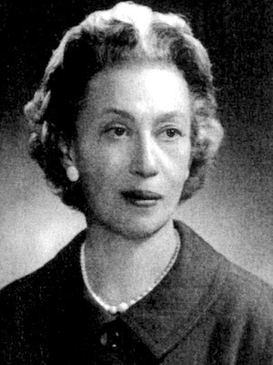Helene Ollendorff Curth
German psychiatrist and psychoanalyst
Helene Ollendorff Curth (1899–1982) was a prominent German psychiatrist and psychoanalyst known for her contributions to the field of child psychology and her work with refugees during and after World War II.
Early Life and Education[edit | edit source]
Helene Ollendorff was born in Berlin, Germany, in 1899. She grew up in a family that valued education and intellectual pursuits. Her early interest in the human mind led her to study medicine at the University of Berlin, where she graduated with a degree in medicine in the early 1920s.
Career[edit | edit source]
After completing her medical degree, Ollendorff Curth specialized in psychiatry and psychoanalysis. She trained under some of the leading figures in the field, including Karl Abraham and Melanie Klein. Her work focused on the psychological development of children, and she became known for her innovative approaches to child therapy.
Work with Refugees[edit | edit source]
During the rise of the Nazi regime in Germany, Ollendorff Curth, who was of Jewish descent, fled to the Netherlands and later to the United Kingdom. In the UK, she worked with refugee children who had been displaced by the war. Her work was instrumental in helping these children cope with the trauma of displacement and loss.
Post-War Contributions[edit | edit source]
After World War II, Ollendorff Curth continued her work in the field of psychoanalysis. She was involved in the establishment of several institutions dedicated to the study and treatment of psychological disorders in children. Her research contributed significantly to the understanding of child development and the impact of early experiences on mental health.
Personal Life[edit | edit source]
Helene Ollendorff married Ernst Curth, a fellow psychiatrist, and the couple had two children. Her personal experiences as a refugee and a mother deeply influenced her professional work and her understanding of the psychological needs of children.
Legacy[edit | edit source]
Helene Ollendorff Curth's work laid the foundation for modern child psychology and psychoanalysis. Her innovative approaches to therapy and her dedication to helping those affected by war and displacement have left a lasting impact on the field.
Related Pages[edit | edit source]
Search WikiMD
Ad.Tired of being Overweight? Try W8MD's physician weight loss program.
Semaglutide (Ozempic / Wegovy and Tirzepatide (Mounjaro / Zepbound) available.
Advertise on WikiMD
|
WikiMD's Wellness Encyclopedia |
| Let Food Be Thy Medicine Medicine Thy Food - Hippocrates |
Translate this page: - East Asian
中文,
日本,
한국어,
South Asian
हिन्दी,
தமிழ்,
తెలుగు,
Urdu,
ಕನ್ನಡ,
Southeast Asian
Indonesian,
Vietnamese,
Thai,
မြန်မာဘာသာ,
বাংলা
European
español,
Deutsch,
français,
Greek,
português do Brasil,
polski,
română,
русский,
Nederlands,
norsk,
svenska,
suomi,
Italian
Middle Eastern & African
عربى,
Turkish,
Persian,
Hebrew,
Afrikaans,
isiZulu,
Kiswahili,
Other
Bulgarian,
Hungarian,
Czech,
Swedish,
മലയാളം,
मराठी,
ਪੰਜਾਬੀ,
ગુજરાતી,
Portuguese,
Ukrainian
Medical Disclaimer: WikiMD is not a substitute for professional medical advice. The information on WikiMD is provided as an information resource only, may be incorrect, outdated or misleading, and is not to be used or relied on for any diagnostic or treatment purposes. Please consult your health care provider before making any healthcare decisions or for guidance about a specific medical condition. WikiMD expressly disclaims responsibility, and shall have no liability, for any damages, loss, injury, or liability whatsoever suffered as a result of your reliance on the information contained in this site. By visiting this site you agree to the foregoing terms and conditions, which may from time to time be changed or supplemented by WikiMD. If you do not agree to the foregoing terms and conditions, you should not enter or use this site. See full disclaimer.
Credits:Most images are courtesy of Wikimedia commons, and templates, categories Wikipedia, licensed under CC BY SA or similar.
Contributors: Prab R. Tumpati, MD

